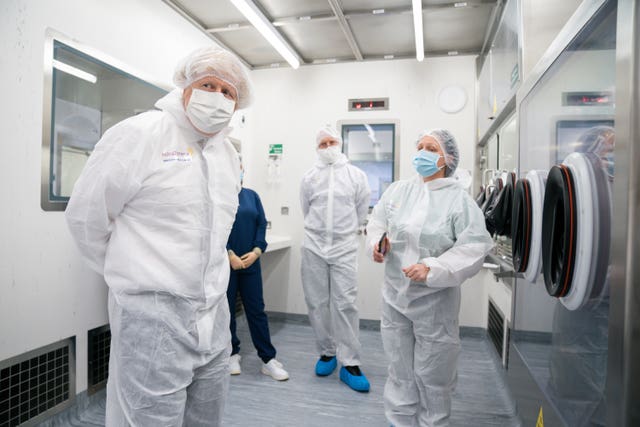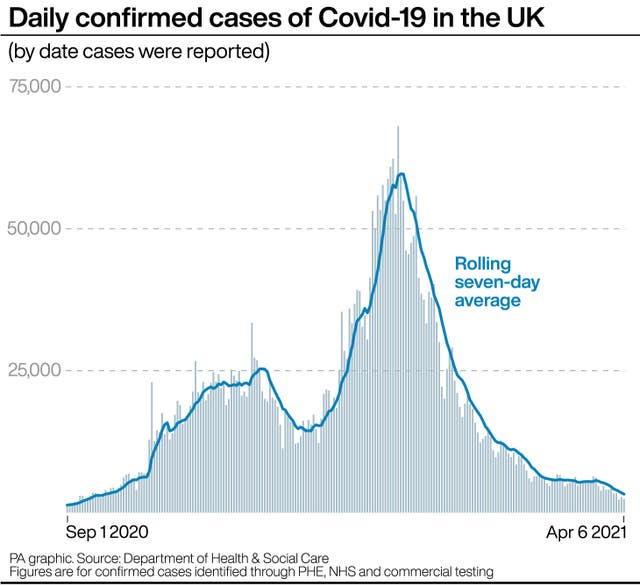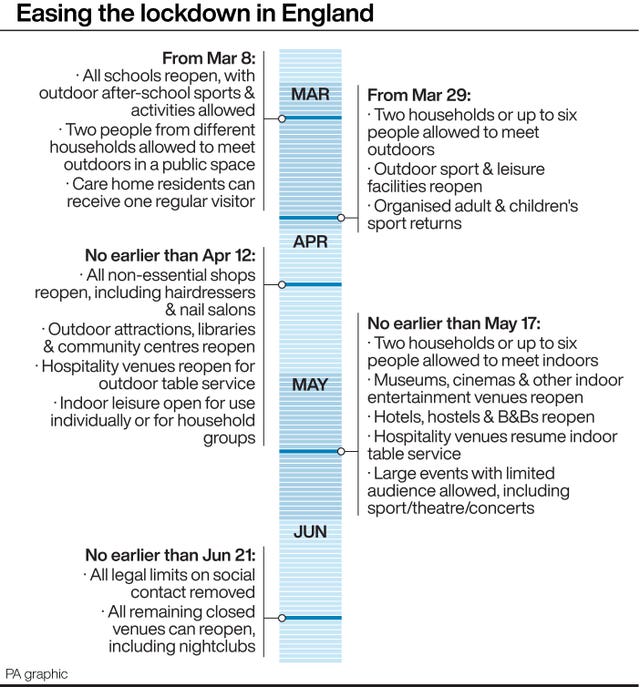Boris Johnson faces battle over ‘un-British’ vaccine passports
The Prime Minister was warned the plans could lead to a ‘Checkpoint Britain’ where people are forced to show their papers.

Boris Johnson faces a battle to introduce domestic vaccine passports after running into fierce opposition from Tory critics and Labour.
A Government review into “Covid status certification” found they could “potentially play a role” in settings such as theatres, nightclubs and mass events, and might also be used in pubs and restaurants to reduce social distancing restrictions.
The prospect of having to show a certificate to access shops or bars has outraged members of the Covid Recovery Group (CRG) of Conservatives, while Labour hit out at the “discriminatory” and “poorly thought-through” proposals.
The use of certificates – which would include vaccination status, test results or evidence of someone having contracted and recovered from Covid-19 – is opposed by at least 40 Conservative MPs.
With Labour’s opposition also hardening, along with the SNP raising concerns, the Government would face difficulties in getting the measures through the Commons if Mr Johnson pushed them to a vote.
Ministers have ruled out bringing in certification for either the April 12 or May 17 stages of the road map but the documents – either in paper form or on an NHS app – could be introduced later this year.
Mr Johnson suggested that vaccination passports for overseas travel were “going to be a fact of life” because a lot of countries were looking at the possibility.

On the domestic front, he indicated “we are also going to look at the role of a number of signals that you can give that you are not contagious”, highlighting the role for mass testing.
“From Friday, everybody can get free lateral flow tests on the NHS and on the web, over the internet,” he said.
“I think that will also be very, very valuable in giving people confidence to open up.”
Tory former minister Steve Baker, the deputy chairman of the CRG, said the requirement to show documents would be “un-British”.
The Government’s review suggested that if an official system is not introduced, firms would be able to ask customers for proof of Covid status in order to access their premises anyway.

But Mr Baker said: “Whether the Government imposes this, recommends it or simply stands back and allows it to happen, Covid status certification would be entirely un-British and our country and values would become unrecognisable.”
He warned the country could be changed forever into the “miserable dystopia of Checkpoint Britain”.
The interim findings of the Government’s review said public transport and essential shops or services would not require vaccine passports.
But that left open the prospect of non-essential retail outlets being forced to check on their customers.
Shadow health secretary Jonathan Ashworth told the BBC: “I’m not going to support a policy that, here in my Leicester constituency, if someone wants to go into Next or H&M, they have to produce a vaccination certificate on their phone, on an app.
“I think that’s discriminatory.”
A senior Labour source said: “On the basis of what we’ve seen and discussed with ministers, we oppose the Government’s plans for domestic vaccine passports.
“They appear poorly thought-through, will put added burdens on business and run the risk of becoming another expensive Whitehall project that gets outsourced to friends of Tory ministers.”
The SNP’s Westminster leader, Ian Blackford, said the ministers must address the “considerable issues” on “equity, ethics and privacy”.
“The UK Government hasn’t published any proposals yet, and the Tory position has been mired in confusion and contradiction. On the basis of the information available, there is not a proposition in front of us that SNP MPs could support,” he said.
“While there might be a need to consider means to facilitate international travel, any such proposals must only be agreed in consultation with the devolved governments.”
In other developments:
– The trial of the Oxford/AstraZeneca vaccine in children was paused while regulators investigate reports of a rare form of blood clot among adults, but the university stressed that no safety concerns have arisen from the trial itself.
– Secondary school and college pupils in England will need to continue wearing face masks in class when they return after Easter as a precautionary measure.
– The Valneva Covid-19 vaccine, which is set to be manufactured in the UK, produces a “strong immune response”, Health Secretary Matt Hancock said following promising results in an early-stage phase one/two study involving 153 people.
– The Prime Minister suggested he was considering allowing travellers returning from low-risk countries to take cheap and fast lateral flow tests rather than the more expensive PCR alternative.
– All pupils across Scotland, except those who are shielding, will be back in the classroom full-time following the Easter holidays.
– A further 20 people were reported to have died within 28 days of testing positive for Covid-19 as of Tuesday, bringing the UK total by that measure to 126,882.
– Figures to April 5 showed 31,622,367 have received a first dose of vaccine, a rise of 40,744 on the previous day, while 5,496,716 have also been given a second jab, an increase of 64,590.
Meanwhile, the Prime Minister insisted he would not deviate from his road map out of lockdown despite warnings from scientific advisers that the plan could result in a third wave of coronavirus cases and deaths.
The Scientific Pandemic Influenza Group on Modelling (Spi-M), which advises the Government, produced a paper dated March 31 suggesting later stages of the road map out of lockdown was “highly likely” to lead to increased hospital cases and deaths.
Speaking to reporters during a visit to an AstraZeneca plant in Macclesfield, Mr Johnson said: “At the moment, as I look at all the data, I can’t see any reason for us to deviate from the road map that we have set out, we are sticking to it.”

Further relaxations of restrictions in England are pencilled in for May 17 and June 21.
Mr Johnson has already confirmed April 12 will see the next step along the road map, with shops, pub beer gardens, gyms and hairdressers among premises allowed to reopen.





